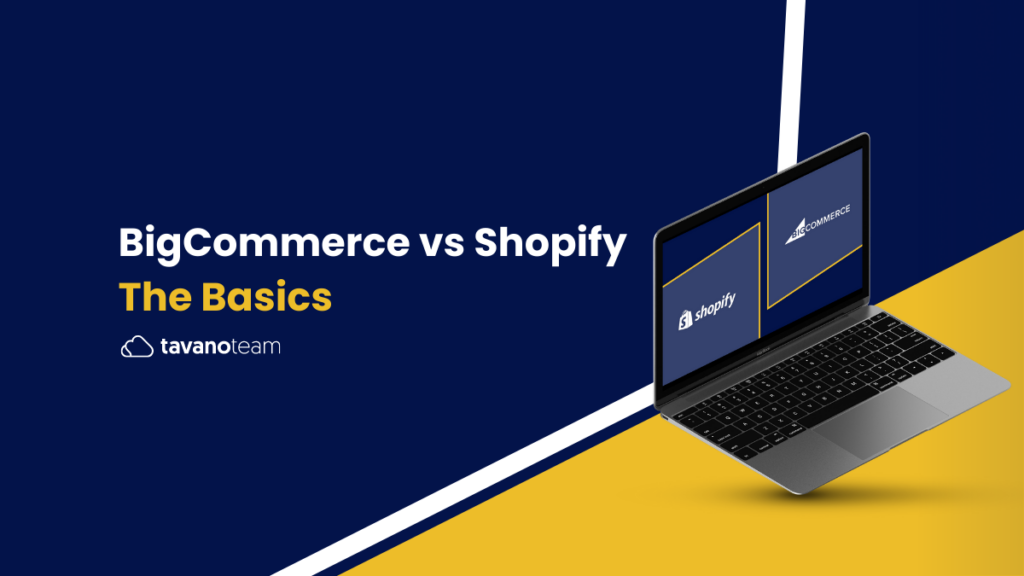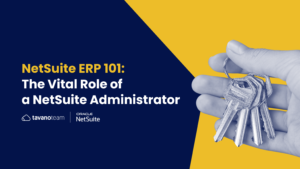Choosing an eCommerce platform can be overwhelming at first. Especially if you’re new to the eCommerce industry! There are many great options and many factors to consider. Shopify and BigCommerce are two platforms that have gained massive popularity over the years. At Tavano Team, we are partners with both. Fortunately, both Shopify and BigCommerce can be integrated seamlessly with NetSuite ERP and at Tavano Team we are experts at that!
Today, we’ll go through the main points you need to consider when choosing the perfect platform for your future site, and the comparison between these two platforms.
PRICING
Both BigCommerce and Shopify are ‘software as a service’ (SaaS) tools. You have to pay annually or monthly to maintain them.
BigCommerce
BigCommerce offers 4 pricing plans:
- BigCommerce Standard: $29.95 per month
- BigCommerce Plus: $79.95 per month
- BigCommerce Pro: $299.95 per month
- BigCommerce Enterprise: varies depending on requirements
Shopify
Shopify offers 5 pricing plans:
- Lite: $9 per month
- Basic Shopify: $29 per month
- Shopify: $79 per month
- Advanced Shopify: $299 per month
- Shopify Plus: pricing varies depending on requirements
On both platforms, you can get free trials before deciding, and you can get a discount if you pay upfront annually.
Pricing is similar on both platforms, except for the Shopify “Lite” plan, which doesn’t exactly provide you with a complete online store: it allows you to sell your products on social media channels such as Facebook, and gives you a “Shopify Button” (an embeddable widget to add a shopping cart to an existing website or online presence). The Lite plan can also be used to sell offline, by providing you Shopify backend for inventory and order management.
So, let’s compare the Shopify “Basic” and BigCommerce “Standard” plans, which are both a good starting point for eCommerce newbies. They cost almost the same ($29 vs $29.95) and they both allow you to sell an unlimited number of products.
However, here are some things that BigCommerce’s Standard plan offers, that Shopify’s Basic plan doesn’t:
- professional reporting functionality
- a built-in ratings and review system
- fully automatic currency conversion
- real-time carrier shipping quotes
Just to be clear, Shopify does not provide built-in ratings and reviews in any of its plans. However, it does provide a free app that you can install for this purpose.
Now, here are some things that Shopify Basic has and BigCommerce Standard doesn’t:
- Unlimited sales (BigCommerce Standard has a limit of $50,000 a year)
- Abandoned cart saver (BigCommerce has this only on Plus or higher plans)
The abandoned cart saver is more important than it can sound. It emails clients who leave your site mid-transaction, and it has the potential of increasing your website’s conversions significantly.
So, as you can see, pricing does not define anything. Each platform has its perks and unique features that will probably be more important at the decision-making stage. Here they are.
TEMPLATES
The main idea of eCommerce platforms is to allow you to create your own website without needing to code anything yourself. They’ll give you many template options (free and paid-for), you pick your favorite, customize it according to your business needs, and you get going. This is why templates are a big deal: they’ll define your website’s structure.
Free templates
Both Shopify and BigCommerce have a relatively small selection of free templates: 15 for Shopify and 12 for BigCommerce.
We can say Shopify themes have more differences between each other, offering a wider range of variety, while BigCommerce’ are more similar in general.
Both platforms offer a drag-and-drop interface to edit the themes easily and intuitively, but Shopify only makes that option available for 4 of its 15 free themes (Dawn, Sense, Craft, and Crave). For the rest, you get a more traditional, text-based editor.
Paid-for templates
When it comes to “premium” themes, there are a lot more options. In BigCommerce you get around 175 paid-for themes that start at $150 up to $300, although you might be able to get a discount for some.
Shopify, on the other hand, offers around 75 paid-for templates which range from $150 to $350.
Again, similarly to free templates, some of BigCommerce’s premium themes look similar to each other, while the paid-for Shopify themes are generally more distinct from each other.
You can take a look at the Shopify themes here or the BigCommerce themes here.
Remember these themes are customizable to your liking. If you don’t find one that you like enough, there’s always the option to buy a third-party theme.
SELLING
Payment Gateways
Shopify and BigCommerce both allow you to connect many payment gateway options to your online store. Shopify offers 100+ and BigCommerce around 40 (keep in mind that the number may vary depending on the country).
Shipping options
BigCommerce and Shopify both allow you to set up a variety of shipping factors (free shipping rates, flat rates, price-based rates, weight-based rates, calculated (‘real time’) shipping rates from third-party carriers), but BigCommerce goes beyond when it comes to third party real-time shipping rates.
You can access this functionality on any of BigCommerce’s plans, whereas with Shopify this is only available by paying monthly for an ‘Advanced Shopify’ or ‘Shopify plus’ plan, paying annually for any other plan, or paying an add-on monthly fee to unlock real-time shipping quotes.
However, if you’re based in Australia, Canada, the UK, or the US, you can provide real-time carrier quotations on any Shopify plan as long as you work with carriers that are partnered with Shopify (Sendle, Hermes, Canada Post, USPS, UPS or DHL Express) and offer discounts on shipping costs by doing so.
Conclusions
So, these are some of the basic things you need to know about these two amazing platforms when the time comes to choose.
Still not convinced about one option? Keep in mind that both Shopify and BigCommerce are amazing platforms. From what we’ve seen, we believe Shopify often works better for B2C retail companies, and BigCommerce has become one of the best options for B2B businesses! However, we’ll soon cover other features that might make a difference for your specific eCommerce.
Meanwhile, you can contact our NetSuite eCommerce experts and they’ll guide you through any eCommerce-related decision you might need to make.




